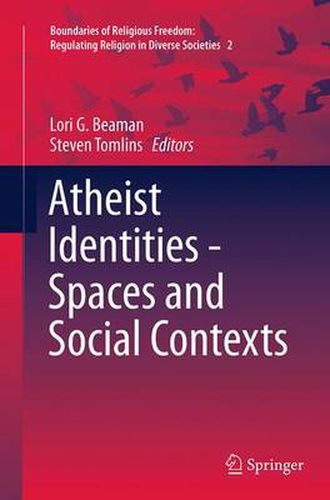Readings Newsletter
Become a Readings Member to make your shopping experience even easier.
Sign in or sign up for free!
You’re not far away from qualifying for FREE standard shipping within Australia
You’ve qualified for FREE standard shipping within Australia
The cart is loading…






This title is printed to order. This book may have been self-published. If so, we cannot guarantee the quality of the content. In the main most books will have gone through the editing process however some may not. We therefore suggest that you be aware of this before ordering this book. If in doubt check either the author or publisher’s details as we are unable to accept any returns unless they are faulty. Please contact us if you have any questions.
The essays in this book not only examine the variety of atheist expression and experience in the Western context, they also explore how local, national and international settings may contribute to the shaping of atheist identities. By addressing identity at these different levels, the book explores how individuals construct their own atheist-or non-religious-identity, how they construct community and how identity factors into atheist interaction at the social or institutional levels. The book offers an interdisciplinary comparative approach to the analysis of issues relating to atheism, such as demography, community engagement, gender politics, stigmatism and legal action. It covers such themes as: secularization; the social context of atheism in various Western countries; the shifting of atheist identities based on different cultural and national contexts; the role of atheism in multicultural settings; how the framework of reasonable accommodation applies to atheism; interactions and relationships between atheism and religion and how atheism is represented for political and legal purposes. Featuring contributions by international scholars at the cutting edge of atheism studies, this volume offers unique insights into the relationship between atheism and identity. It will serve as a useful resource for academics, journalists, policy makers and general readers interested in secular and religious studies, identity construction and identity politics as well as atheism in general.
$9.00 standard shipping within Australia
FREE standard shipping within Australia for orders over $100.00
Express & International shipping calculated at checkout
This title is printed to order. This book may have been self-published. If so, we cannot guarantee the quality of the content. In the main most books will have gone through the editing process however some may not. We therefore suggest that you be aware of this before ordering this book. If in doubt check either the author or publisher’s details as we are unable to accept any returns unless they are faulty. Please contact us if you have any questions.
The essays in this book not only examine the variety of atheist expression and experience in the Western context, they also explore how local, national and international settings may contribute to the shaping of atheist identities. By addressing identity at these different levels, the book explores how individuals construct their own atheist-or non-religious-identity, how they construct community and how identity factors into atheist interaction at the social or institutional levels. The book offers an interdisciplinary comparative approach to the analysis of issues relating to atheism, such as demography, community engagement, gender politics, stigmatism and legal action. It covers such themes as: secularization; the social context of atheism in various Western countries; the shifting of atheist identities based on different cultural and national contexts; the role of atheism in multicultural settings; how the framework of reasonable accommodation applies to atheism; interactions and relationships between atheism and religion and how atheism is represented for political and legal purposes. Featuring contributions by international scholars at the cutting edge of atheism studies, this volume offers unique insights into the relationship between atheism and identity. It will serve as a useful resource for academics, journalists, policy makers and general readers interested in secular and religious studies, identity construction and identity politics as well as atheism in general.